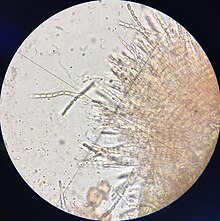Phomatospora is a genus of fungi within the class Sordariomycetes,[3] and since 2016, in the family Phomatosporaceae and order Phomatosporales.[4][5] They are found in terrestrial, freshwater and marine habitats,[6] across the world except Russia and Canada.[2]
| Phomatospora | |
|---|---|

| |
| Phomatospora coprophila | |
| Scientific classification | |
| Kingdom: | |
| Division: | |
| Subdivision: | |
| Class: | |
| Order: | |
| Family: | |
| Genus: | Phomatospora |
| Type species | |
| Phomatospora berkeleyi [1] Sacc.
| |
| Synonyms[2] | |
|
Cryptonectriopsis (F.von Höhnel) Weese, 1919 | |
Species
editAs accepted by Species Fungorum;[7]
- Phomatospora acaciae Sousa da Câmara (1936)
- Phomatospora acrostichi K.D. Hyde (1988)
- Phomatospora admontensis Nograsek (1991)
- Phomatospora albomaculans Tak. Kobay. & K. Sasaki (1982)
- Phomatospora anacardiicola Bat. (1957)
- Phomatospora annonae Bat. & Cif. (1957)
- Phomatospora aquatica Minoura & T. Muroi (1978)
- Phomatospora archontophoenicis Joanne E. Taylor, K.D. Hyde & E.B.G. Jones (2003)
- Phomatospora arenaria Sacc., E. Bommer & M. Rousseau (1890)
- Phomatospora argentina Speg. (1880)
- Phomatospora artocarpi T.S. Ramakr. & Sundaram (1953)
- Phomatospora aucubae (Shirai & Hara) Tak. Kobay. & Y. Suto (1983)
- Phomatospora bellaminuta Kohlm., Volkm.-Kohlm. & O.E. Erikss. (1995)
- Phomatospora berkeleyi Sacc. (1875)
- Phomatospora biseriata Senan., Camporesi & K.D. Hyde (2016)
- Phomatospora caricicola Petr. (1929)
- Phomatospora concinna Petr. (1954)
- Phomatospora convolvuli Gonz. Frag. & Cif. (1925)
- Phomatospora coprophila M.J. Richardson (1972)
- Phomatospora cylindrotheca Petr. (1953)
- Phomatospora cymbisperma (Speg.) Petr. & Syd. (1934)
- Phomatospora dinemasporium J. Webster (1955)
- Phomatospora endopteris W. Phillips & Plowr. (1885)
- Phomatospora errabunda Petr. & Cif. (1932)
- Phomatospora feltgenii Sacc. & P. Syd. (1902)
- Phomatospora feurichiana Kirschst. (1939)
- Phomatospora filarszkyi Petr. (1923)
- Phomatospora gelatinospora M.E. Barr (1970)
- Phomatospora hederae Feltgen (1901)
- Phomatospora heveae Saccas (1954)
- Phomatospora hyalina (Griffiths) Cain (1933)
- Phomatospora ingae Syd. (1939)
- Phomatospora insignis Petr. (1925)
- Phomatospora juncicola (Jaap) L. Holm (2012)
- Phomatospora kamatii Tilak & Talde (1980)
- Phomatospora kandeliae K.D. Hyde (1992)
- Phomatospora kentiae Speg. (1909)
- Phomatospora leptasca (Peck & Clinton) J. Reid & C. Booth (1966)
- Phomatospora lithocarpi M.E. Barr (1994)
- Phomatospora luteotingens J. Fourn. & Lechat (2010)[8]
- Phomatospora macarangae Hansf. (1957)
- Phomatospora minutella (Peck) M.E. Barr (1994)
- Phomatospora minutissima (Sacc.) N. Lundq. (1972)
- Phomatospora miurana I. Hino & Katum. (1966)
- Phomatospora moravica Petr. (1924)
- Phomatospora muskellungensis Fallah & Shearer (1998)
- Phomatospora napoleoneae (Thüm.) Aa (2002)
- Phomatospora nypae K.D. Hyde (1993)[9]
- Phomatospora nypicola K.D. Hyde & Alias (1999)
- Phomatospora opuntiae Bat. & A.F. Vital (1955)
- Phomatospora oryzopsidis Sousa da Câmara (1932)
- Phomatospora pandani (Ellis & Everh.) Theiss. (1917)
- Phomatospora paulensis Rehm (1907)
- Phomatospora phragmiticola Poon & K.D. Hyde (1998)
- Phomatospora podocarpi Syd. (1930)
- Phomatospora punctulata I. Hino & Katum. (1958)
- Phomatospora radegundensis Scheuer (1988)
- Phomatospora ribesia (Cooke & Massee) Sacc. (1891)
- Phomatospora rosae Rehm (1913)
- Phomatospora saccardoi Rehm (1882)
- Phomatospora salvadorina S. Ahmad (1948)
- Phomatospora sandwicensis Petr. (1953)
- Phomatospora secalina Feltgen (1903)
- Phomatospora sphaerulina Grove (1922)
- Phomatospora striatigera Scheuer (1988)
- Phomatospora striatispora M.E. Barr (1994)
- Phomatospora stroggylospora M.E.A. Costa & Sousa da Câmara (1953)
- Phomatospora tamarindi Dhaware (1982)
- Phomatospora trevoae Speg. (1910)
- Phomatospora triseptata Raja & Shearer (2008)
- Phomatospora uniseriata Phukhams., M.V. de Bult & K.D. Hyde (2020)
- Phomatospora viticola Senan., Camporesi & K.D. Hyde (2016)
- Phomatospora wisteriae Ellis & Everh. (1902)
References
edit- ^ Sacc., Nuovo G. bot. ital. 7(4): 306 (1875)
- ^ a b "Phomatospora Sacc., 1875". www.gbif.org. Retrieved 16 September 2023.
- ^ Lumbsch TH, Huhndorf SM. (December 2007). "Outline of Ascomycota – 2007". Myconet. 13. Chicago, USA: The Field Museum, Department of Botany: 1–58.
- ^ Senanayake, I.C.; Al-Sadi, A.M.; Bhat, J.D.; Camporesi, E.; Dissanayake, A.J.; Lumyong, S.; Maharachchikumbura, S.S.N.; Hyde, Kevin D. (2016). "Phomatosporales ord. nov. and Phomatosporaceae fam. nov., to accommodate Lanspora, Phomatospora and Tenuimurus, gen. nov". Mycosphere. 7 (5): 628–641.
- ^ Wijayawardene, Nalin; Hyde, Kevin; Al-Ani, Laith Khalil Tawfeeq; Somayeh, Dolatabadi; Stadler, Marc; Haelewaters, Danny; et al. (2020). "Outline of Fungi and fungus-like taxa". Mycosphere. 11: 1060–1456. doi:10.5943/mycosphere/11/1/8. hdl:11336/151990.
- ^ Raja, H.A.; Shearer, C.A. (2008). "Freshwater ascomycetes: new and noteworthy species from aquatic habitats in Florida". Mycologia. 100: 467–489.
- ^ "Species Fungorum - Search Page - Phomatospora". www.speciesfungorum.org. Retrieved 16 September 2023.
- ^ Fournier, J.; Lechat, C. (2010). "Phomatospora luteotingens sp. nov., a new aquatic species of Phomatospora from France and Spain". Mycosphere. 1: 39–43.
- ^ Hyde, Kevin D. (1993). "Fungi from palms. V. Phomatospora nypae sp. nov. and notes on marine fungi from Nypa fruticans in Malaysia". Sydowia. 45: 199–203.